|
|
|
Sort Order |
|
|
|
Items / Page
|
|
|
|
|
|
|
| Srl | Item |
| 1 |
ID:
110564
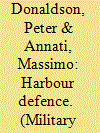

|
|
|
| 2 |
ID:
164024
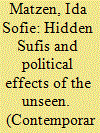

|
|
|
|
|
| Summary/Abstract |
Based on ethnographic fieldwork in Lahore, Pakistan, this article explores the political effects of the activities of hidden Sufi saints. In Pakistan, hidden Sufis are often said to intervene in worldly affairs (for example, in the killing of Osama bin Laden). Analyzing the wider cosmological background for claims to Sufi supremacy and power, I show how unseen—or in fact ‘supremely visible’—domains outstrip the visible world. In doing so, I examine how Sufi followers draw on esoteric knowledge to create what is in effect a political theory to analyze the violent present of opposition and terror attacks. Contrary to a general notion of Pakistani Sufis as inherently apolitical, the article thus offers an account of Sufi protection and spiritual governance as instances of ‘cosmological activism.’ To appreciate local Sufi theorizing and practices as expressions of immanent political modalities of Pakistani Sufism, I attend to my interlocutors’ versions of the Sufi principle of the ‘oneness of existence’ (wahdat al-wujud) as a potential anthropological analytics.
|
|
|
|
|
|
|
|
|
|
|
|
|
|
|
|
| 3 |
ID:
175471
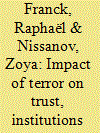

|
|
|
|
|
| Summary/Abstract |
This article takes advantage of the timing in the implementation of the European Social Survey (ESS) in Israel to assess the impact of political violence on individual attitudes towards trust, institutions and redistribution. The results suggest that a terror attack occurring on the day of an interview positively and significantly improves individual views on interpersonal trust but does not modify views on political and legal institutions. Furthermore, rocket attacks make respondents more likely to support redistribution policies, and unlike terror attacks, have a persistent impact on individual attitudes.
|
|
|
|
|
|
|
|
|
|
|
|
|
|
|
|
| 4 |
ID:
173762
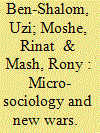

|
|
|
|
|
| Summary/Abstract |
This study explores the “black box” of face-to-face violence during terror attacks. It is based upon visual analysis of a representative sample of terror attacks that occurred in Israel during 2015–2016, a period which is labeled “The Intifada of Individuals.” We offer a new method for this purpose by using available materials that military sociologists can retrieve and employ when they use the “macro”-level framework in their study of “micro”-level actions. The abundance of audiovisual devices allows a new perspective of belligerent friction typical of “New Wars.” Our methodology includes a combination of video and audio materials from open sources. Our analysis untangles the complexities of belligerency by minimizing the overall occurrences to the actions of the antagonist, the disrupter, and the crowd. We discuss our understandings for policy making concerning armament of civilians and overcoming the manipulation of terror attacks by media, government, and terrorists.
|
|
|
|
|
|
|
|
|
|
|
|
|
|
|
|
| 5 |
ID:
175721


|
|
|
|
|
| Summary/Abstract |
This essay uses the official reports as well as sources from the intelligence services to provide a clearer picture of the working circumstances of the Belgian intelligence and security services and the pressure they were under to deal with the challenges posed by violent radicalisation and terrorist plots since the emergence of the foreign fighters phenomenon. It will be shown how mounting pressure from the rapidly expanding threat exacerbated the gradual exhaustion of the security services by structural issues of unaddressed organisational difficulties, and budget restrictions faced with increasing workloads. Due to the high number of foreign fighters, belated initiatives taken to assess the threat were impeded by barriers to information exchange, unclear guidance, and data overload. The failure of Belgian intelligence to detect the attack plans was more a symptom of policy failure than the underachievement of the services. A concluding section will reflect upon the inadequacy and lateness of policy responses because of a Belgian tendency to understate security.
|
|
|
|
|
|
|
|
|
|
|
|
|
|
|
|
| 6 |
ID:
184115
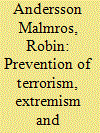

|
|
|
|
|
| Summary/Abstract |
National approaches to prevent terrorism, extremism, and radicalisation have changed considerably over the last decades. Previous studies mapping these changes have primarily relied on empirical analyses of formal policy and political processes. This case-study of Sweden takes an alternative route, and analyses a dataset of 1405 Swedish newspaper articles (1985–2019) using a new institutional theory and social movement theory framework. Therethrough, the paper is able to provide new insights into the emergence and development of an institutional issue field concerned with the prevention of terrorism, extremism, and radicalisation. More specifically, the paper highlights the unstable, fragmented, dynamic and contested character of the field’s development. Frames containing the problems and solutions considered most important during each of the field’s five stages are identified, and the subsequent institutional and organisational consequences are discussed. The paper also considers how terror attacks and other extremism-related events impact the institutionalisation and alternation of dominant frames, and identifies the translation and development of an inclusive vocabulary as pivotal to mobilising a broad and diverse set of actors to co-produce preventive efforts.
|
|
|
|
|
|
|
|
|
|
|
|
|
|
|
|
| 7 |
ID:
142095
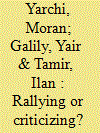

|
|
|
|
|
| Summary/Abstract |
The reaction of authorities to terror attacks or threats has the potential to attract both support and criticism. The current study aims to examine the international media's discourse surrounding authorities' reaction to sporting events that have suffered from terror attacks or terror threats. A comparison is made between events that are canceled and events that take place as planned despite the attack or threat. Our findings indicate no significant differences between the coverage of events that are canceled and those that continue as planned. The evidence actually exhibits greater levels of support rather than criticism of authorities in international media coverage.
|
|
|
|
|
|
|
|
|
|
|
|
|
|
|
|
| 8 |
ID:
097760
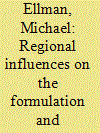

|
|
|
|
|
| Publication |
2010.
|
| Summary/Abstract |
The article provides an analysis of the regional input into NKVD order 00447, the deadliest of the 1937-1938 state terror attacks on the Soviet population. This regional input concerned the decision to establish regional troikas, the choice of the target groups, the size of the initial limits, the extension of the deadline for completing the operation, the relationship between the initial limits and the final number of victims, the relationship between the final limits and the final number of victims, the actual victims, and unauthorised terror. It is argued that the formulation and implementation of order 00447 was a dynamic process of interaction between the centre and the regions in which the regions played a significant, but subordinate, role.
|
|
|
|
|
|
|
|
|
|
|
|
|
|
|
|
| 9 |
ID:
113265
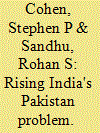

|
|
|
|
|
| Publication |
2010.
|
| Summary/Abstract |
This article identifies the persistent India-Pakistan rivalry as a paired minority conflict and argues that, as the predominant actor, India needs to shed its historical complexes and engage Pakistan proactively. By transcending its traditional reluctance, fears and prejudices, India must demonstrate that it can make use of its recently established economic and socio-political clout to be a dominant force in the region. A review of different scenarios for the future of Pakistan and possible Indian responses to another terrorist attack on Mumbai indicates that India's best option would be to evolve a multilevel and long-term 'carrot and stick' strategy towards its neighbour. Beyond ineffectual Track II dialogues, an excessive focus on Kashmir and myopic decisions determined by domestic contingencies, India needs to build the necessary trust and solve its Pakistan problem by focusing on deeper economic interdependence and sustained civil society contacts, and revive its nuclear disarmament plans.
|
|
|
|
|
|
|
|
|
|
|
|
|
|
|
|
| 10 |
ID:
172160


|
|
|
|
|
| Summary/Abstract |
In recent years, the number of suicidal terror attacks in advanced societies has decreased, inducing the public to widely remove the issue from public post-modern debate. Yet as, among many other examples, the attacks on a church in Sri Lanka’s capital Colombo in April 2019 with more than 250 dead and 500 wounded have shown, the age of suicide terrorism is far from over. On the contrary, the archetype remains one of the most present influences in the unconscious imaginary of globalisation, including that of open societies. We shouldn’t forget that we still have a lot of work to do in order to better understand and solve the problem, writes Roland Benedikter.
|
|
|
|
|
|
|
|
|
|
|
|
|
|
|
|
| 11 |
ID:
110856
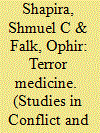

|
|
|
|
|
| Publication |
2012.
|
| Summary/Abstract |
The surge in mass casualty terror attacks during the first decade of the 21st century presented a special challenge for health organizations. Unique types of injury resulting from these Mass Casualty Events called for special capabilities to restore the balance between immediate demands and scarce resources. Post Traumatic Stress Disorder (PTSD), to both victims and healthcare providers and first responders required extra knowledge and early intervention. All these and the concerns of the possibilities of non-conventional weapons terror attacks, led to the defining of "Terror Medicine", a new medical field. This field evolves the medical macro management of terror attacks, the focused clinical management of the specific injuries and coping with the aftermath consequences. The scope of Terror Medicine is: Prevention, Preparedness, Response and Recovery. The evolution and trends of Terror Medicine is discussed in this article.
|
|
|
|
|
|
|
|
|
|
|
|
|
|
|
|
|
|
|
|
|